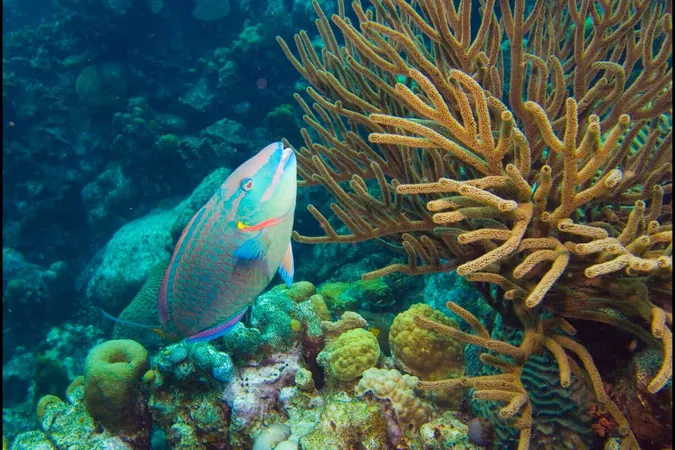
Alarm Bell: Caribbean Coral Reefs on the Brink of Collapse by 2040!
2025-09-19
Author: Siti
A Dire Warning for the Caribbean's Coral Reefs
A startling new study reveals that most Caribbean coral reefs could cease growing and begin to erode by the year 2040 if the trend of unchecked global warming continues. These vibrant ecosystems, which serve as essential barriers against coastal flooding during storms, are facing an existential crisis.
The Crucial Role of Coral Reefs
Coral reefs, particularly those close to shorelines, play a vital role in protecting coastlines from the devastating impacts of rising seas and storm surges. For these reefs to fulfill their natural protective function, they must grow rapidly enough to keep pace with rising sea levels. Unfortunately, this growth is increasingly threatened by a toxic mix of pollution, diseases, and climate change.
The Climate Change Catastrophe
Climate change is wreaking havoc on reefs globally. As ocean temperatures rise, coral bleaching becomes more common, leading to mass mortality and increased vulnerability to external threats. Furthermore, elevated carbon dioxide levels are acidifying seawater, complicating the corals' ability to form their protective skeletons.
Monitoring the Decline: Research Insights
Led by Chris Perry from the University of Exeter in the U.K., researchers have observed the alarming degradation of coral reefs in the Caribbean, including famous areas like the Florida Keys and Mexico's Caribbean coast. The team studied ancient fossil reefs, exposed by coastal uplifts, to gain insights into how different coral types have built reefs throughout history.
A Grim Forecast for Coral Growth
Using ecological data from over 400 modern reef sites, the study calculated current coral growth rates and employed climate models to predict changes by 2100 under various global warming scenarios. The projections are sobering: over 70% of Caribbean reefs could stop growing by 2040, and nearly all could face severe erosion by 2100 if global temperatures rise by just 2°C above pre-industrial levels.
An Inescapable Challenge: Rising Sea Levels
The analysis indicates that coral growth is unlikely to keep up with rising sea levels. By 2060, many reefs could experience an additional 0.3 to 0.5 meters (1 to 1.6 feet) of water above them, increasing to 0.7 to 1.2 meters (2.3 to 3.9 feet) by 2100.
Coral Reefs: Cradle of Marine Life and Fisheries
Beyond their protective functions, coral reefs are crucial habitats for countless marine species and are the backbone of vital fisheries that communities around the world depend on. If coral growth cannot keep pace with sea level rise, the reefs' capacity to shield coastlines will diminish, heightening the risks of coastal erosion and flooding, while jeopardizing ecosystems like seagrass meadows.
Urgent Action Needed to Combat Global Warming
To prevent catastrophic outcomes for coral reefs and coastal communities, it is imperative to take decisive action to limit global warming to below 2°C. The time to act is now; the survival of these precious ecosystems hangs in the balance.



 Brasil (PT)
Brasil (PT)
 Canada (EN)
Canada (EN)
 Chile (ES)
Chile (ES)
 Česko (CS)
Česko (CS)
 대한민국 (KO)
대한민국 (KO)
 España (ES)
España (ES)
 France (FR)
France (FR)
 Hong Kong (EN)
Hong Kong (EN)
 Italia (IT)
Italia (IT)
 日本 (JA)
日本 (JA)
 Magyarország (HU)
Magyarország (HU)
 Norge (NO)
Norge (NO)
 Polska (PL)
Polska (PL)
 Schweiz (DE)
Schweiz (DE)
 Singapore (EN)
Singapore (EN)
 Sverige (SV)
Sverige (SV)
 Suomi (FI)
Suomi (FI)
 Türkiye (TR)
Türkiye (TR)
 الإمارات العربية المتحدة (AR)
الإمارات العربية المتحدة (AR)